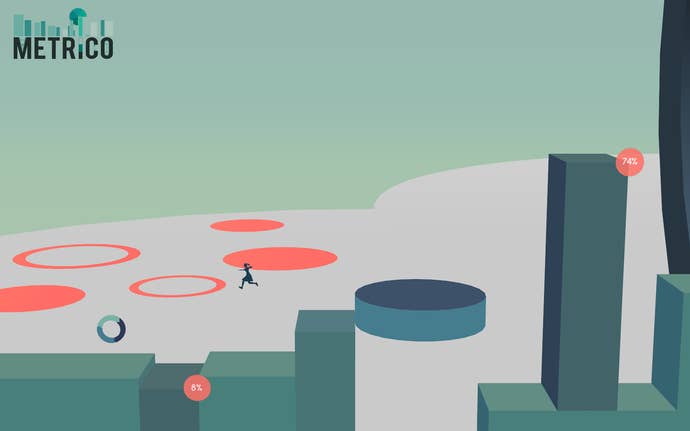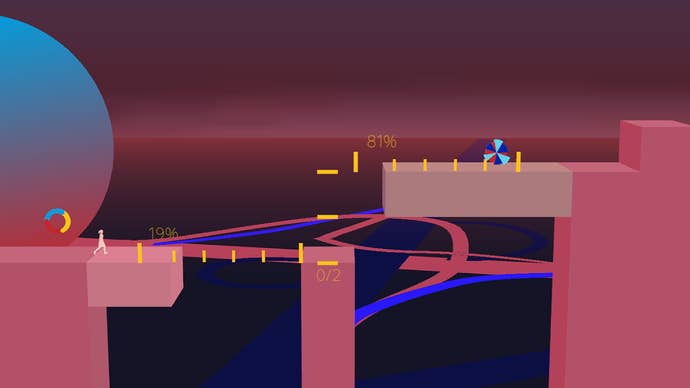Metrico PlayStation Vita Review: Barring the Way
Metrico is an excellent puzzle-platformer that undermines its elegant simplicity with gimmicky controls.
This article first appeared on USgamer, a partner publication of VG247. Some content, such as this article, has been migrated to VG247 for posterity after USgamer's closure - but it has not been edited or further vetted by the VG247 team.
Part of the magic of the PlayStation Vita is its digital-only library, which is full of old classics, great re-releases, and solid indie games. There's a bunch of smaller, quirky titles that don't have solid places on home consoles. They only exist because the Vita is around, giving players a high-resolution portable experience. Metrico is one of those games.
Metrico is a puzzle game with an interesting visual style: it takes place on moving infographics. Bar graphs, line graphs, and pie charts form the world your avatar is navigating through. It all feels like the wild fever dream of a mechanical engineer, trapped in an Oz of his own mental creation. The artstyle and presentation is one of the best things about Metrico; it's a great idea and developer Digital Dreams implemented it well. There are some framerate issues that cause the entire game to stutter and can throw you out of your flow, but Metrico is still a great-looking game.

Metrico is a living world and each of the infographics react to your movements in a different way. Some graphs and platforms move left when you move left, or vice-versa. Some raise or lower when you jump. Some move depending on your proximity to a specific area onscreen. Digital Dreams calls the overall aesthetic "Input Morphing", meaning your direct input changes the environment. The infographic aesthetic extends to the context clues for each puzzle. You'll see numbers and figures alongside each obstacle: a percentage, "X/3", or other indicator gives you clues about how to proceed. You'll use trial-and-error to determine what makes these numbers change, and by extension, what opens up the path forward. Across all six worlds, you'll run, jump, and plot your way to the end.
At its heart, Metrico is a puzzle-platformer. Figuring out which moves to you need to make to get from point A to point B is only part of the problem. You also need the physical dexterity to perform moves in quick succession or with precise timing. That moves Metrico beyond similar puzzle games like Intelligent Qube, Echochrome, or Echoshift, where the challenge is only solving each stage. Half of my deaths in Metrico happened during experimentation, figuring out each level's puzzles; the other half were caused by jumping or moving too fast or too slow. That will probably shut out a number of players who would otherwise enjoy Metrico.
Metrico throws a number of different inputs at you as you dive farther into the game. The problem is, some situations are entirely too complex. Metrico uses every form of input on the PlayStation Vita: you'll tilt the system, use the touchscreen, and even use the rear-facing camera to solve puzzles. Not all of the controls are tuned well either: the Vita's touchscreen is crazy sensitive, so it can be hard to perform moves that require it. When Metrico puts three different control schemes together in a single puzzle, you'll find yourself wanting to walk away from the whole thing. Metrico throws too much at the player in an attempt to put the PlayStation Vita through its paces, which is a shame because the early part of the game is the most satisfying.
Even worse, some of the tilt controls and camera puzzles actually get in the way of the Vita's status quo as a portable. You can't play everywhere you go, because certain puzzles will require certain things. On a plane or car ride? The tilt function could get frustrating. Out on an errand or in a dark room? You might have trouble finding the specific color a camera puzzle requires. It's sad that Metrico gets in its own way like that, because when it keeps things simple, it's really good. Simplicity is best.

There's also hints of a deeper story that never fully materialize. You can choose a male or female avatar - excellent! - and there are sections are the end of each world where you choose from two different paths. Like Telltale Games titles, the game lets you know which path other players chose. The problem is they ultimately lead to nothing. It's disappointing only because it felt like it was going somewhere in a narrative sense.
Metrico also features a great electronica soundtrack - created by a Dutch composer named Palmbomen - that is a wonderful complement to the stark and simple visuals. Each world has its own distinct style and the music is a big part of enhancing that effect. I'd recommend playing with headphones on, otherwise you'll lose some of the audiovisual magic.
Metrico is a title with a lot of promise, but the latter part of the game undermines all the greatness in the beginning. If Digital Dreams hadn't tried so hard to justify the Vita as a platform, I think the game would turned out better. As it stands, Metrico is good, but not great.
VisualsMetrico's graphical presentation is minimal and beautiful, but tainted by framerate issues.
SoundThe electronica soundtrack complements the visuals perfectly.
InterfaceThe interface is as minimal as the graphics.
Lasting AppealOnce you've beaten the game, the only reason to return is to collect all the extra Trophies.
ConclusionMetrico is beautiful puzzle-platformer with a great minimal, infographic-inspired aesthetic complemented by an awesome soundtrack. Unfortunately, the game gets in its own way by focusing on gimmicky Vita controls. It has moments of greatness, but ends up just being "good".

